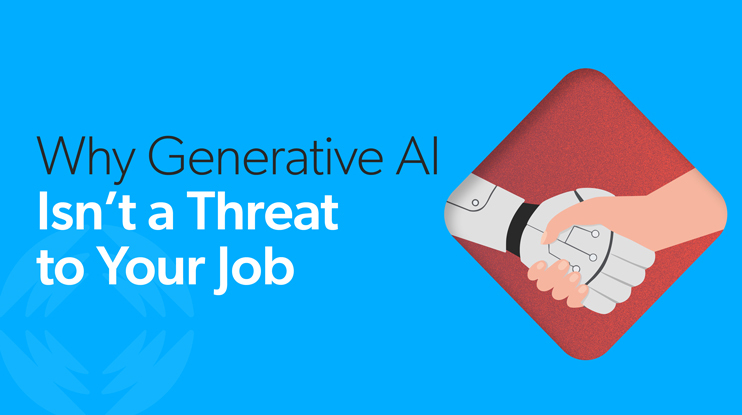Contrary to broad speculation, employees gain lasting career benefits from the integration of generative AI in the workplace. By aptly answering complex questions within workflows, it expands employee knowledge on the fly.
GenAI can do so uniquely because it’s a paradigm shift in information retrieval. This follows from its power to integrate company platforms.
Below we’ll go through pain points experienced daily by employees relying on outdated technology. We’ll explore how AI-powered search and generative answering can help smoothen workflows, reduce burnout and frustration, and enhance employee productivity and satisfaction.
1. Finding Relevant Information in Seconds
In 2023, employees spent on average three hours a day looking for information. Why? Content is stored in silos: 89% of employees search between 1 to 6 sources to find what they need.
Draining this much time by scouring multiple platforms, links, and silos isn’t just less than optimal: it amplifies employee frustration, elevates the risk of burnout, and inevitably leads to greater talent turnover. Given that 21% of employees would wish to leave a company entirely for this reason, it’s all the more vital for businesses to make life easier for valuable employees if they hope to retain them.
The solution? Unified search — a centralizing layer of intelligence that can be the connective tissue between existing systems. This type of search enables access to relevant knowledge from a single point, whether that point is an employee intranet, self-help portal, or website. Unified search uses AI to minimize sifting through lists of blue links, instead ensuring that the right document or piece of information is right at the top of the search results.
You can even further enhance this experience with other AI tools such as generative answering, which can synthesize the answer to a question even when that answer is spread piecemeal across multiple documents.
2. Employees Gain Knowledge Exponentially Faster
Even with robust search, it’s up to the employee to sift through all sources, filtering and gathering the information needed. This process can go on for hours to days.
The problem is that no one has the time or the attention span for this anymore: there’s too much text to sort through.
With generative answering, employees get a neatly synthesized answer based on the most relevant sources surfaced from the index. Reuters’Future of Professionals report estimates that AI will save professionals 12 hours per week of work by 2029, mostly by taking care of rote tasks. For this reason, 78% of professionals believe it will be a “force for good” in their field, and thus 66% expect to have “more time spent on engaging, judgement-based or expertise-driven work.”
For the banking industry, 90% of leaders report that the integration of GenAI has led to a rise in employee satisfaction and productivity, according to a survey conducted by the SAS Institute.
Given that GenAI’s boon derives precisely from its power to cut through repetitive tasks, it frees up greater time for workers to devote to those tasks that actually make up their job description. For doctors and lawyers, this translates to more time devoted to patients or clients.
Generative AI is accomplished in part via retrieval augmented generation (RAG). The entire process takes just seconds – and the employee has gained from it a wealth of new knowledge she or he can immediately apply to work tasks.
SAP Concur, after implementing Coveo’s Relevance Generative Answering, saw an 80% decrease in the number of searches made to its site. People were finding solutions to their problems and needed exponentially fewer queries to do so.
3. Siloed Search Implementations Are Connected
Employees don’t just lack the time to sift through dozens of sites for information; they also don’t have patience for websites with underdeveloped search facilities. Businesses can’t hide behind the excuse that they’re not Google or Amazon. In 2022, 86% of people in a 4,000-respondent client survey agreed that they expect enterprise search to be as good as Google search.
Employees and customers are not two different breeds of people. Both use the same apps and have been conditioned to rely on the same level of advanced algorithm-sorting quietly well-attuned to their needs and wishes. In turn, when enterprises run on outdated search capabilities, the contrast is felt strongly, and frustration is sure to follow. Employees expect search query predictions and autocomplete, for sites to retain facet choices, as well as highly-aware recommendation algorithms to tell them what’s needed next.
When search is unified and supported by AI, employees aren’t confined to searching within a single system. Instead, they’re brought results that reside among multiple platforms, and AI models do the sifting and organizing for the searcher. Instead of spending time figuring out not only where the right document is, but also what is the right document, employees can get the answer they need to continue on with their bigger tasks.
4. Knowledge Sharing Is Encouraged
Another major benefit of having a centralized index and robust search is the encouragement of knowledge sharing. Knowledge hoarding occurs when employees refrain from sharing valuable knowledge they have because doing so is beneficial to their own advancement.
Of course, not all knowledge can be transferred easily, since much of it comes from individual experience (i.e., tacit knowledge). But an AI-search platform can contribute to knowledge sharing by democratizing access to important internal sources.
When a company instills a culture of knowledge sharing, all are better off for it. Each person gains by sharing and in turn receiving valuable information they themselves wouldn’t have had otherwise. The result is that the company as a whole thrives, both in regard to employees individually and in regard to its common objectives, KPIs, and bottom line.
Making all such statistics common property in the enterprise, by having them sorted neatly and rendered accessible to all employees within their workflows, is another important way of demonopolizing knowledge.
5. The Power of Search Analytics
For most companies, the volume of data pouring in from all touchpoints is so vast that nearly all of it goes unused. The enterprise may invest hefty sums into a system that tracks all sorts of customer interactions, but it is crucial that this be organized intoclean data.
Instead, the data often resides in the enterprise’s servers in an unsorted and unusable state. Vital consumer insights go to waste, which could have otherwise been helpful to an employee’s job.
But an effective, all-in-one AI-search platform can help enterprises improve their data cleaning and knowledge management processes. Coveo’s solution, for instance, provides a comprehensive dashboard with configurations gathering insights from all end user interactions with a Coveo search interface. Again, this is possible because all those domains are connected together in the unified index.
Using Coveo’s analytics, the Project Management Institute (PMI) reduced its content gap score by 80% in two years. The use of AI-platform analytics provided employees with an efficient way of identifying organizational lacunae, which reduced the energy-draining effect of rote scouring through multiple platforms. Consequently, employees could direct their energy towards the bulk of their actual work.
Takeaways
Throughout this article, our goal has been to walk through core aspects of an AI search platform and demystify the technology. In so doing, we counter the hysteria associated with it while the business world still makes sense of the AI revolution.
What we have seen is that AI search platforms, and generative answering in particular, should not be regarded as threats to employees, but are largely tools for solving problems and improving the work experience.
Rather than eliminating and replacing jobs, then, AI can actually promote employee engagement, enhance the individual’s skill level, and reduce talent turnover by helping businesses retain valuable employees.
Dig Deeper
Learn more about the ways Coveo AI can help uplevel your digital workplace.


